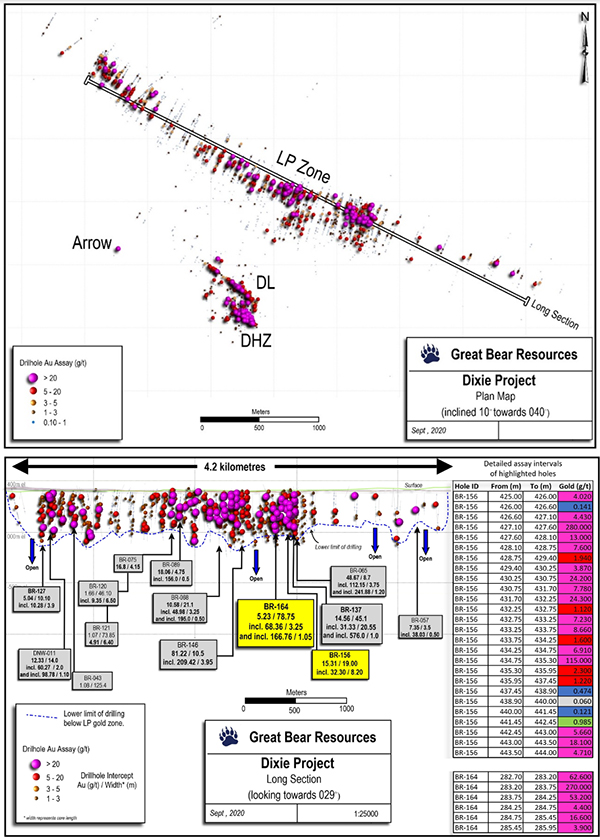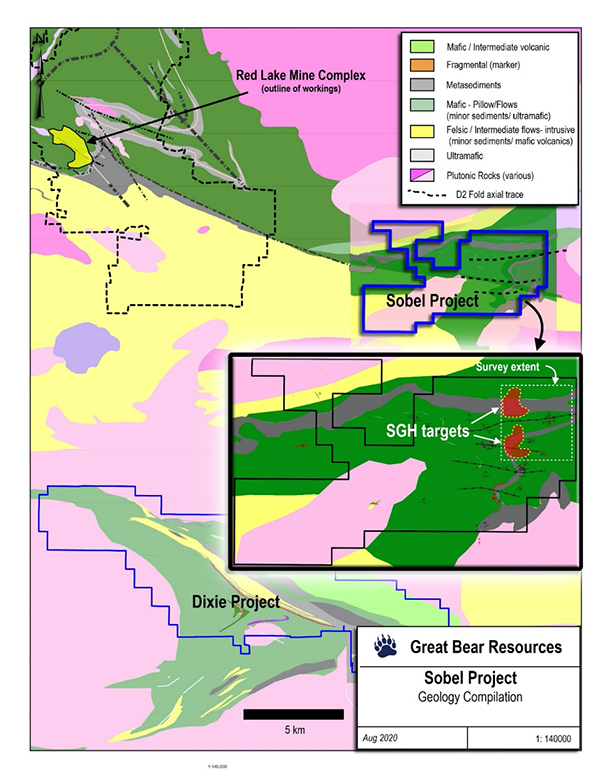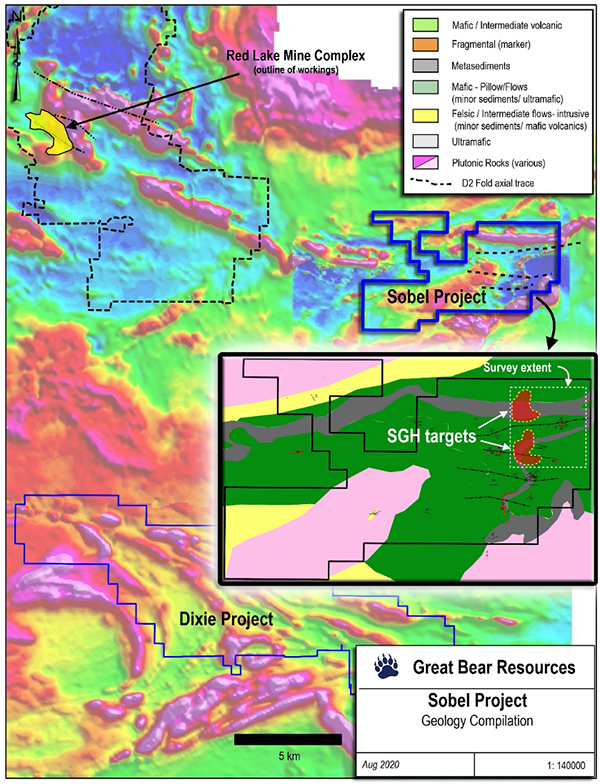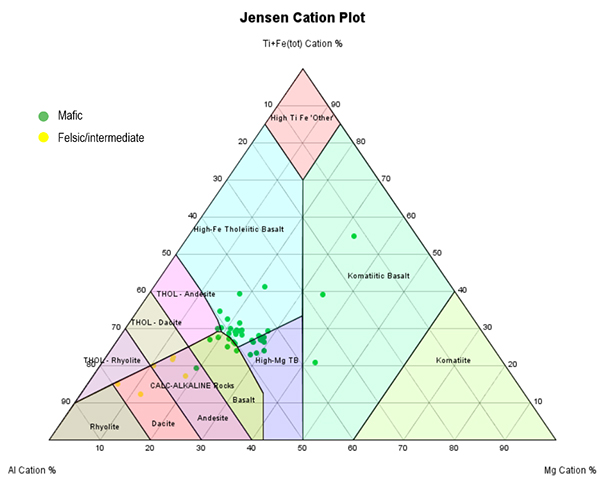Great Bear Drills 32.30 g/t gold Over 8.20 m Within 8.08 g/t Gold Over 37.70 m, and 68.36 g/t Gold Over 3.25 m Within 5.23 g/t Gold Over 78.75 m at LP Fault at Dixie; Identifies New Gold Targets at the Sobel Property
September 9, 2020
September 9, 2020 – Vancouver, British Columbia, Canada – Great Bear Resources Ltd. (the "Company" or "Great Bear", TSX-V: GBR; OTCQX: GTBAF) today reported results from its ongoing fully funded $21 million exploration program at its 100% owned flagship Dixie Project, and from regional exploration at its Sobel Property, both of which are located in the Red Lake district of Ontario.
Dixie Project Highlights Include:
- Drilling continues to define gold mineralization on 50 metre centres along 5 kilometres of strike length of the LP Fault, to a vertical depth of approximately 500 metres. All (100%) of the 161 LP Fault drill holes completed to date have successfully intersected the structure and gold mineralization.
- New results include 8.08 g/t gold over 37.70 metres on section 20050 towards the centre of the LP Fault zone in drill hole BR-156. High-grade sub intervals include a high strain zone (see news release of August 4, 2020) which assayed 32.30 g/t gold over 8.20 metres, including a strongly mineralized core of 146.50 g/t gold over 1.00 metre.
- 50 metres to the northwest on drill section 20100, new drill hole BR-164 intersected the along-strike continuation of the same mineralization including 5.23 g/t gold over 78.75 metres. This included two high strain zones assaying 68.36 g/t gold over 3.25 metres and 60.30 g/t gold over 2.15 metres. The drill hole also included an additional interval of 11.08 g/t gold over 3.85 metres below the intervals reported above. Table 1.
- The Company continues to advance its geological model of the LP Fault zone as it defines and refines controls to high-grade gold domains. Higher grade gold domains are localized within high strain and higher vein density corridors. Both of these styles of high-grade gold occur within the larger envelope of gold mineralization in felsic and metasedimentary host rocks. An updated geological model will be provided as this work progresses.
- An updated long section of LP Fault drill results is provided in Figure 1, along with a plan view of all results to-date from significant gold zones. Gold intercepts are shown using the same assay display criteria in both section and plan view.
Chris Taylor, President and CEO of Great Bear said, “With increasing drill density on 50 metre centres, continuity of gold mineralization at the LP Fault is readily apparent in plan and section view. We’ve provided an updated plan map and long section in this release, showing the same intercept grade projections in both images for the first time. Our geological team continues to model the high strain and deformed quartz vein zones which host the majority of the high-grade gold within the LP Fault. We expect to be able to release the results of this work over the coming weeks. This will provide our current comprehensive interpretation of gold grade distribution characteristics within the LP Fault and will be an important step towards completion of our initial maiden resource.”
Table 1: Current LP Fault drill results. Drill sections are arranged from southeast (top of Table) to northwest (bottom of Table).
| Drill Hole | From (m) | To (m) | Width* (m) | Gold (g/t) | Section | |
| BR-162 | 162.40 | 165.90 | 3.50 | 0.65 | 18650 | |
| BR-156 | 313.50 | 321.00 | 7.50 | 1.07 | 20050 | |
| and | 351.10 | 351.90 | 0.80 | 78.20 | ||
| and | 403.00 | 406.50 | 3.50 | 2.36 | ||
| and | 411.00 | 448.70 | 37.70 | 8.08 | ||
| including | 425.00 | 444.00 | 19.00 | 15.31 | ||
| and including | 427.10 | 435.30 | 8.20 | 32.30 | ||
| and including | 427.10 | 428.10 | 1.00 | 146.50 | ||
| and including | 427.10 | 427.60 | 0.50 | 280.00 | ||
| BR-163 | 372.00 | 443.20 | 71.20 | 0.45 | 20100 | |
| including | 411.00 | 422.00 | 11.00 | 1.24 | ||
| BR-164 | 263.90 | 342.65 | 78.75 | 5.23 | 20100 | |
| including | 282.70 | 285.95 | 3.25 | 68.36 | ||
| and including | 283.20 | 284.25 | 1.05 | 166.76 | ||
| and including | 308.00 | 332.00 | 24.00 | 6.94 | ||
| and including | 325.45 | 327.60 | 2.15 | 60.30 | ||
| and | 346.30 | 350.15 | 3.85 | 11.08 | ||
| including | 349.65 | 350.15 | 0.50 | 83.50 | ||
| and | 417.00 | 468.10 | 51.10 | 0.72 | ||
| including | 426.00 | 452.00 | 26.00 | 1.10 | ||
| and including | 446.00 | 448.50 | 2.50 | 4.99 | ||
| BR-154 | 373.50 | 423.00 | 49.50 | 0.30 | 20250 | |
| including | 394.00 | 395.00 | 1.00 | 4.35 | ||
| and | 646.40 | 649.95 | 3.55 | 1.06 | ||
| and | 711.00 | 723.45 | 12.45 | 0.44 | ||
| BR-151A | 276.00 | 289.00 | 13.00 | 5.39 | 20300 | |
| and | 461.00 | 468.00 | 7.00 | 1.16 | ||
| BR-152 | 343.00 | 386.40 | 43.40 | 0.31 | 20350 | |
| and | 396.00 | 405.50 | 9.50 | 0.45 | ||
| and | 483.20 | 490.20 | 7.00 | 0.45 | ||
| and | 622.50 | 624.00 | 1.50 | 1.74 | ||
| and | 673.10 | 679.10 | 6.00 | 0.51 |
Table 1 Continued
| Drill Hole | From (m) | To (m) | Width* (m) | Gold (g/t) | Section | |
| BR-147 | 19.75 | 65.25 | 45.50 | 1.30 | 20500 | |
| and | 33.00 | 55.90 | 22.90 | 2.10 | ||
| including | 48.00 | 49.50 | 1.50 | 13.74 | ||
| and | 222.20 | 228.45 | 6.25 | 1.18 | ||
| including | 222.20 | 223.50 | 1.30 | 4.09 | ||
| and | 272.70 | 281.10 | 8.40 | 1.12 | ||
| including | 279.00 | 280.00 | 1.00 | 5.76 | ||
| and | 328.50 | 344.55 | 16.05 | 1.01 | ||
| and | 336.50 | 339.50 | 3.00 | 3.08 | ||
| BR-148 | 148.00 | 162.75 | 14.75 | 0.42 | 20500 | |
| including | 156.10 | 156.80 | 0.70 | 4.05 | ||
| and | 283.50 | 299.50 | 16.00 | 0.53 | ||
| BR-149 | 254.15 | 263.25 | 9.10 | 2.64 | 20800 | |
| including | 257.45 | 263.25 | 5.80 | 4.04 | ||
| and including | 257.45 | 258.00 | 0.55 | 33.70 | ||
| and | 269.00 | 273.00 | 4.00 | 7.26 | ||
| including | 270.00 | 270.75 | 0.75 | 37.00 | ||
| and | 280.00 | 352.20 | 72.20 | 0.68 |
*Widths are drill indicated core length, as insufficient drilling has been undertaken to determine true widths at this time. Average grades are calculated with un-capped gold assays, as insufficient drilling has been completed to determine capping levels for higher grade gold intercepts. Average widths are calculated using a 0.10 g/t gold cut-off grade with up to 3 m of internal dilution of zero grade.
Red Lake District Regional Exploration Update
Regional exploration is also underway at Great Bear’s other Red Lake district properties (Sobel, Dedee, and Pakwash properties), with all regional exploration during summer 2020 designed to meet annual government of Ontario expenditure requirements, and having no significant impact on the Company’s ongoing $21 million exploration program, which remains focused on the Dixie Project.
Current results relate to the Sobel property, which was acquired to control prospective stratigraphy within the Red Lake Greenstone Belt along the same regional D2 fold axis that controls the majority of gold mineralization at the Red Lake Gold Mine.
Highlights of regional exploration at the Sobel property include:
- Completion of a 399 sample, four square kilometre Spaciotemporal Geochemical Hydrocarbon (“SGH”) survey similar to that used by Great Bear to successfully identify gold mineralization at the LP Fault, Dixie Limb and Hinge zones at the Dixie property.
- Identification of two large SGH targets at the Sobel property, respectively measuring approximately 800 metres by 500 metres, and 900 metres by 450 metres. Figure 2.
Figure 1: Inclined plan view and updated long section of drill results to date.
- The SGH targets overlie regional D2 fold closures with a similar geological and structural setting to the gold zones at the RLGM, and the Hinge zone at the Dixie property. These targets are apparent on regional geophysics and were predicted by Great Bear’s exploration team to have gold mineralization potential prior to undertaking the SGH survey. Figure 3.
- Prospecting, geological mapping and geochemical analysis have identified mafic volcanic rocks including high iron tholeiite and basaltic komatiite, both of which are known to occur within the tholeiitic-komatiitic Balmer sequence of the Red Lake Greenstone Belt, which host the majority of past and current gold production in the Red Lake district. These are locally in contact with units of meta-sediments, intermediate, felsic and intrusive rocks. Figure 4.
Given the identification of the new SGH targets, the Company will continue exploration at Sobel through the remainder of 2020, including expansion of the SGH sample grid, additional geological mapping, prospecting, target identification and refinement. A comprehensive update on further work will be provided prior to any drilling at Sobel.
Chris Taylor continued, “We’ve repeated some of the early exploration steps taken at our flagship Dixie project and have identified two new potential gold targets at the Sobel property within the right rocks. These are located near regional D2 fold hinges and fold axes that are expected to potentially be significant gold controls. We believe these areas are prospective for Hinge zone (Dixie)/RLGM-style gold-bearing quartz veins within mafic host rocks. Our next steps include additional mapping, expansion of the SHG grid, rock sampling, and planning for preliminary drilling which may be undertaken as early as winter 2020 - 2021.”
About the SGH Survey
Actlabs describes the SGH survey as follows: “Actlabs’ Spatiotemporal Geochemical Hydrocarbon (SGH) analysis is designed to target mineralization under cover. SGH research since 1996 has shown that surficial material adsorbs hydrocarbon compounds released from the decomposition of bacteria and microbes that have fed on a mineral target at depth. Near surface samples, including soil, sediment, peat, till and sand are collected, the weakly-bound, heavy hydrocarbons in the C5-C17 carbon series range are desorbed at the laboratory, and over 160 of these compounds are analysed by Gas Chromatography/Mass Spectrometry (GC/MS). The unique mixture of compounds is like a fingerprint that provides a highly-confident, forensic, identification of the mineralization at depth. SGH is blind to the inorganic content of samples and thus does not reflect mobilized anomalies or any nugget effects. It is a cost-effective technique which can be used in tandem with geophysics to improve drill targeting success rate.”
Figure 2: Geological map of the Red Lake Mine Complex and Great Bear's Sobel Property. Locations of the newly discovered SGH targets are shown in the inset. The location of the Dixie Project is also shown.
Figure 3: Regional geophysics (airborne magnetic total field data shown) illustrating on strike continuation of stratigraphy from the Red Lake Gold Mine to the Sobel Property, and regional folding. Inset same as Figure 2.
Figure 4: Jensen cation plot of geochemical results from mafic and felsic rock samples collected at the Sobel Property.
Updated drill collar locations, azimuths and dips, together with an updated complete assay table for the LP Fault drilling to-date will be posted to the Company’s web site at www.greatbearresources.ca. Drill collar locations, azimuths and dips for the drill holes included in this release are provided in the table below:
|
Hole ID |
Easting | Northing | Elevation | Depth | Dip | Azimuth |
| BR-147 | 457079 | 5634100 | 355 | 531 | -60 | 210 |
| BR-148 | 457033 | 5634023 | 358 | 465 | -60 | 210 |
| BR-149 | 456872 | 5634368 | 356 | 849 | -61 | 212 |
| BR-151A | 457359 | 5634268 | 358 | 753 | -56 | 210 |
| BR-152 | 457328 | 5634347 | 358 | 762 | -55 | 210 |
| BR-154 | 457428 | 5634324 | 362 | 807 | -57 | 208 |
| BR-156 | 457571 | 5634240 | 365 | 642 | -56 | 207 |
| BR-162 | 458784 | 5633466 | 364 | 338 | -55 | 212 |
| BR-163 | 457531 | 5634273 | 367 | 699 | -55 | 206 |
| BR-164 | 457493 | 5634178 | 361 | 672 | -56 | 206 |
About the Dixie Project
The Dixie Project is 100% owned, comprised of 9,140 hectares of contiguous claims that extend over 22 kilometres, and is located approximately 25 kilometres southeast of the town of Red Lake, Ontario. The project is accessible year-round via a 15 minute drive on a paved highway which runs the length of the northern claim boundary and a network of well-maintained logging roads.
The Dixie Project hosts two principle styles of gold mineralization:
- High-grade gold in quartz veins and silica-sulphide replacement zones (Dixie Limb, Hinge and Arrow zones). Hosted by mafic volcanic rocks and localized near regional-scale D2 fold axes. These mineralization styles are also typical of the significant mined deposits of the Red Lake district.
- High-grade disseminated gold with broad moderate to lower grade envelopes (LP Fault). The LP Fault is a significant gold-hosting structure which has been seismically imaged to extend to 14 kilometres depth (Zeng and Calvert, 2006), and has been interpreted by Great Bear to have up to 18 kilometres of strike length on the Dixie property. High-grade gold mineralization is controlled by structural and geological contacts, and moderate to lower-grade disseminated gold surrounds and flanks the high-grade intervals. The dominant gold-hosting stratigraphy consists of felsic sediments and volcanic units.
About the Sobel Property
The 3,200-hectare Sobel property is located along the strike extension of the main D2 fold axial plane which could be a control for gold mineralization at Evolution Mining’s Red Lake Gold Mine. The Sobel property is located [approximately 10 kilometres] east of the Red Lake Gold Mine.
Great Bear has the option to earn a 100% interest in the Sobel property, which consists of 3,200 hectares of continuous mineral claims, subject to payment of an additional $40,000 over a period of two years. The Sobel property is free of any royalties.
About Great Bear
Great Bear Resources Ltd. is a well-financed gold exploration company managed by a team with a track record of success in mineral exploration. Great Bear is focused in the prolific Red Lake gold district in northwest Ontario, where the company controls over 300 km2 of highly prospective tenure across 4 projects: the flagship Dixie Project (100% owned), the Pakwash Property (earning a 100% interest), the Dedee Property (earning a 100% interest), and the Sobel Property (earning a 100% interest), all of which are accessible year-round through existing roads.
QA/QC and Core Sampling Protocols
Drill core is logged and sampled in a secure core storage facility located in Red Lake Ontario. Core samples from the program are cut in half, using a diamond cutting saw, and are sent to Activation Laboratories in Ontario, an accredited mineral analysis laboratory, for analysis. All samples are analysed for gold using standard Fire Assay-AA techniques. Samples returning over 10.0 g/t gold are analysed utilizing standard Fire Assay-Gravimetric methods. Pulps from approximately 5% of the gold mineralized samples are submitted for check analysis to a second lab. Selected samples are also chosen for duplicate assay from the coarse reject of the original sample. Selected samples with visible gold are also analyzed with a standard 1 kg metallic screen fire assay. Certified gold reference standards, blanks and field duplicates are routinely inserted into the sample stream, as part of Great Bear’s quality control/quality assurance program (QAQC). No QAQC issues were noted with the results reported herein.
Qualified Person and NI 43-101 Disclosure
Mr. R. Bob Singh, P.Geo, Director and VP Exploration, and Ms. Andrea Diakow P.Geo, Exploration Manager for Great Bear are the Qualified Persons as defined by National Instrument 43-101 responsible for the accuracy of technical information contained in this news release.
ON BEHALF OF THE BOARD
“Chris Taylor”
Chris Taylor, President and CEO
Investor Inquiries:
Mr. Knox Henderson
Tel: 604-646-8354
Direct: 604-551-2360
info@greatbearresources.ca
www.greatbearresources.ca
Cautionary note regarding forward-looking statements
This release contains certain “forward looking statements” and certain “forward-looking information” as defined under applicable Canadian and U.S. securities laws. Forward-looking statements and information can generally be identified by the use of forward-looking terminology such as “may”, “will”, “should”, “expect”, “intend”, “estimate”, “anticipate”, “believe”, “continue”, “plans” or similar terminology. The forward-looking information contained herein is provided for the purpose of assisting readers in understanding management’s current expectations and plans relating to the future. Readers are cautioned that such information may not be appropriate for other purposes.
Forward-looking information are based on management of the parties’ reasonable assumptions, estimates, expectations, analyses and opinions, which are based on such management’s experience and perception of trends, current conditions and expected developments, and other factors that management believes are relevant and reasonable in the circumstances, but which may prove to be incorrect.
Great Bear undertakes no obligation to update forward-looking information except as required by applicable law. Such forward-looking information represents management's best judgment based on information currently available. No forward-looking statement can be guaranteed and actual future results may vary materially. Accordingly, readers are advised not to place undue reliance on forward-looking statements or information.





